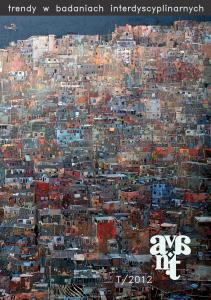
We kindly inform you that, as long as the subject affiliation of our 300.000+ articles is in progress, you might get unsufficient or no results on your third level or second level search. In this case, please broaden your search criteria.





Author’’s interpretation of the phenomenon of otočki rock rests upon the attempt to read the islandness constructed by music and music constructed by islandness through the texts of otočki rock –– its music, its lyrics and multiple levels of its verbalization in extramusical texts that it is encircled by. If we can talk about islandness as a cultural fact and individual experience, can it be, and how, (re)construced in music? How does, then, this ““message”” sent from the perspective of the ““island”” musicians grasp the receptors of its coastal and continental –– non-island –– listeners and interpreters? Can their islandness itself, and through which mechanisms, serve as a guarantee to the otočki rock musicians to rise up above the sea of non-islandness of the rest of the domestic popular music scene? On the existence of which imagination precisely does this category count on and which Island does it create and invoke through its promotional discourses? And finally, is there a non-island part of the otočki rock and how is it poeticized and set to music? –– these are some of the starting questions of the interpretation of the otočki rock phenomenon presented in this article.
More...
The task of this contribution is to point to the complexity of the Dalmatian folklore urban song [dalmatinska folklorna gradska pjesma] as a musical phenomenon, and to show, taking into account all the research conducted so far, why the Dalmatian folklore urban song is the subject of ethnomusicological research.
More...
An effort has been made with this research to gain an insight into the extent to which the music practice of Srebrenica has changed in the context of the 1992–1995 war and the genocide committed in July 1995, but also to uncover how much music has remained amongst the surviving Bosniacs of Srebrenica, how relevant it is in relation to the major human tragedy, and how much of an integral part of the culture and life of the survivors it is today. Examples of the range of religious music practice are presented in the paper, of the international humanitarian organisations’ music therapy projects, along with examples of music works of diverse genres that have emerged in the name of Srebrenica.
More...
Based on this innovative literary source, the composer created a libretto of his mono-opera „Ateh or the revelations of the Khazar princess”. As a librettist, Ghenadie Ciobanu chose three fragments from the lexicon-novel written by M. Pavic, being captivated especially by the historical actuality of the theme and by the awareness that the “khazars represents a metaphor of a small nation, which survives through the powers and significant religions”
More...
The analysis of a work in the sense set forward by musicology is putting the creation in the centre and assembling it as a unitary element, in which the composer, the musical idea, the interpreter and the listener contribute altogether to the process of communication.The lack of a temporal perspective is redeemed thereof by the cognition of art from its genesis in an overview of the human, social, ethic and aesthetic, of the creative circumstances and up to the consumption by the audience to whom it had been addressed.
More...
Like the violin, cello, oboe, clarinet, etc. which are instruments musicians play as a whole orchestra, the voice is also an instrument by means of which the choir singers are manifest in the whole to which they belong. The quality of choral sonority is influenced by the knowledge and talent which the conductor puts into practice in educating the chorus singing voice through vocalize. This study aims to make a point of the importance of vocalize, a defining aspect in achieving singing technique, sound, timbre and psychological homogeneity of chorus.
More...
Among the composers who have contributed to broadening the limits of the universe of contemporary music Helmuth Lachenmann is well known. At the end of the 1960s using the method of the “dialectical structuralism” Helmuth Lachenmann developed what he defined as “musique concrète instrumentale” – a music made up of mainly noisy tones produced through the non-conventional use of voices and traditional instruments. The composer integrated these new sounds into the European symphonic tradition. In his work Helmuth Lachenmann attempts to prevail over the stereotypes and inertia of auditory perception, as well as to pin down a new understanding of beauty, that he defined as “habit rejection”.
More...
The new treatment of melodrama and cycle of the poems put on music is certain. The continuity of the hero from the character of a comedy of masks and modification of this tradition in a context of expressionism is revealed. Influence of magic of numbers on structure of work is shown. Modification of elements of recent romanticism and symbolism in semantics of work is disclosed.
More...
The history of pianistic pedagogy determined by the instrument development has followed the evolution of pianistic pedagogy in its most important landmarks. We did not set out to exhaustively describe this evolution; we focused our considerations upon the period of the years1950-1960. There is necessary to mention that the object of our approach stood for the issue of pianistic pedagogy and not the pianistics in itself.
More...
Cultural horizons of humanity in any geographic or time space confess the acute and steadfast need of people for music; studied by ethnomusicologists or anthropologists, each type of spiritual culture highlights rites, sacred ceremonies or festive elements from which music is never absent in any of its forms, from the chanting of spells or incantations to shouting or acclamations.
More...